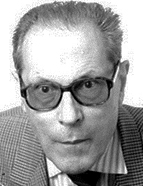

A historian associated with the second generation of the Annales school and a disciple of Fernand Braudel. He was largely responsible for developing studies on the South Atlantic and Brazil in France, as well as on the Americas, alongside Pierre Chaunu. He was the first to hold a French chair in Latin American History at Nanterre. With a background in economics and a strong awareness of quantitative methods, Mauro also dedicated significant attention to conceptual reflections in historiography.
Born on 24 October 1921 in Valenciennes, in northern France, he was the son of a civil engineer from the Midi region who had trained at the École Nationale des Ponts et Chaussées . As a young man, Mauro was involved in the Catholic student movement and developed an early interest in the social sciences, particularly history. This passion was greatly influenced by one of his secondary school teachers, M. Jourcin, who succeeded Fernand Braudel at the Lycée Pasteur in Neuilly-sur-Seine and later served in one of the governments led by Édouard Daladier. Mauro taught at the Lycée Montesquieu in Le Mans, though it lasted only for one academic year (1947-1948). During this time, he attended lectures by Fernand Braudel, then directeur d’études at the École Pratique des Hautes Études (EPHE). Braudel had been invited by the director of the lycée, the doyen Renouvin. Mauro decided to attend Braudel's seminars at the EPEH. Braudel also chaired the jury for Mauro's agrégation. After this stage, Mauro met with his mentor to declare that he was ready to embark on research (Mauro, “L’histoire, en quête du temps et de l’espace” [History, in Search of Time and Space] 1989, p. 1). Mauro then travelled to New York to further his training in economics and, at the start of the 1949 academic year, was appointed assistant professor at the Faculty of Arts and Humanities at the University of Toulouse. For his thesis, Mauro conducted research in Portuguese and Brazilian archives. In Portugal, his research extended beyond Lisbon: he worked in the archives of various cities (Coimbra, Évora, Braga). Notably, he also travelled to the island archives (Madeira and the Azores). In Brazil, he carried out research in the archives of the Northeast and Rio de Janeiro in 1953 and 1954. In São Paulo, where he worked as a visiting professor, Mauro met some of Braudel’s former students (Eurípides Simões de Paula, Eduardo d’Oliveira França and Alice Piffer Canabrava). His keen interest in geography led him to visit the Mantiqueira mountain range and the São Paulo coastline. Mauro’s doctoral thesis, completed in 1957, positioned him among a distinguished group of historians who, following Braudel’s approach, aspired to practise a “total history”—in other words, a methodology that is primarily focused on structures and conjunctures, considering the diverse temporal and spatial frameworks that shaped the actions of the historical actors. His thesis, entitled Le Portugal et l’Atlantique au XVIIe siècle (1570-1670) : Etude économique [Portugal and the Atlantic in the 17th century (1570-1670) Economic Study] (Paris, 1960), was complemented by a critical study of sources: Le Brésil au XVIIe siècle [Brazil in the 17th Century] (Coimbra, 1963). In his main thesis, based on a vast array of archival sources and statistical data, Mauro presented an innovative analysis of the Portuguese economy within the Atlantic context.
This work is financed by national funds through FCT - Foundation for Science and Technology, I.P, in the scope of the projects UIDB/04311/2020 and UIDP/04311/2020.
